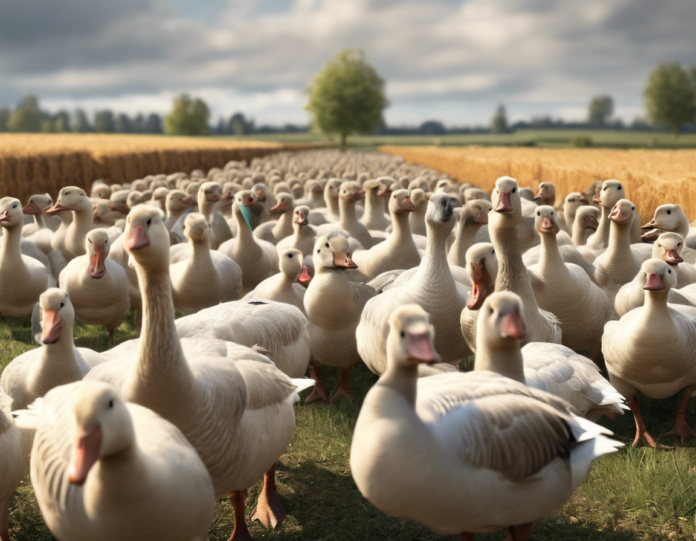Are You Interested in Becoming a Successful Goose Farmer?
Introduction
Goose farming can be a rewarding and profitable venture for those interested in animal husbandry. Geese are not only charming creatures but also provide various products such as eggs, meat, and feathers. In recent years, the demand for organic and locally sourced products has increased, making goose farming a potentially lucrative business opportunity. Whether you are a seasoned farmer looking to diversify your livestock or a newcomer to the agricultural industry, starting a goose farm can be a gratifying experience. This guide aims to provide comprehensive information on how to become a successful goose farmer.
Getting Started
Before diving into goose farming, it is essential to conduct thorough research and planning. Here are some crucial steps to consider when starting your goose farm:
1. Choosing the Right Goose Breed
Selecting the appropriate breed is crucial for the success of your farm. Popular goose breeds for farming include Toulouse, Embden, and Chinese geese. Consider factors such as climate adaptability, egg-laying potential, and meat quality when choosing a breed.
2. Building Suitable Housing
Geese require adequate shelter to protect them from predators and extreme weather conditions. Ensure your goose house is spacious, well-ventilated, and provides access to clean water.
3. Providing Nutritious Feeding
A well-balanced diet is essential for the health and productivity of your geese. They should have access to fresh water, grass, grains, and commercial feed to meet their nutritional requirements.
4. Health Care and Vaccination
Regular health check-ups and vaccination are essential to prevent diseases and ensure the well-being of your geese. Consult with a veterinarian to develop a proper health care plan for your flock.
5. Marketing and Selling Products
Develop a marketing strategy to promote your goose products. Consider selling eggs, meat, feathers, and even live birds to generate income. Explore local markets, online platforms, and direct sales to reach potential customers.
Challenges and Solutions
Like any business, goose farming comes with its own set of challenges. It is important to be prepared for obstacles that may arise and have strategies in place to overcome them:
1. Predators
Predators such as foxes, raccoons, and birds of prey pose a threat to your geese. Install proper fencing, use guard dogs, and secure housing to protect your flock.
2. Disease Outbreaks
Disease outbreaks can significantly impact the health of your geese and the profitability of your farm. Implement biosecurity measures, practice good hygiene, and seek veterinary advice to prevent and control diseases.
3. Market Fluctuations
Market demand for goose products may fluctuate, affecting your sales and revenue. Diversifying your product range, building customer loyalty, and staying informed about market trends can help mitigate the impact of market fluctuations.
FAQs (Frequently Asked Questions)
1. What is the average lifespan of a goose?
Geese can live up to 20-25 years, depending on the breed and environmental factors.
2. How many eggs does a goose lay in a year?
A goose can lay between 20-50 eggs per year, with peak laying season typically in the spring.
3. Do geese require special grooming?
Regular grooming, such as trimming feathers and nail care, is essential for the health and well-being of geese.
4. Can geese be raised alongside other livestock?
Geese can coexist with other livestock such as chickens and ducks, but it is important to provide adequate space and separate feeding areas.
5. What are some common health issues in geese?
Common health issues in geese include respiratory infections, parasites, and bumblefoot. Regular veterinary care and proper hygiene can help prevent these issues.
In conclusion, embarking on a journey to become a successful goose farmer requires dedication, knowledge, and a passion for animal husbandry. By following these guidelines and staying informed about best practices in goose farming, you can build a thriving business and contribute to the sustainable production of high-quality goose products. Remember that perseverance and continuous learning are key to achieving success in this fulfilling venture.












